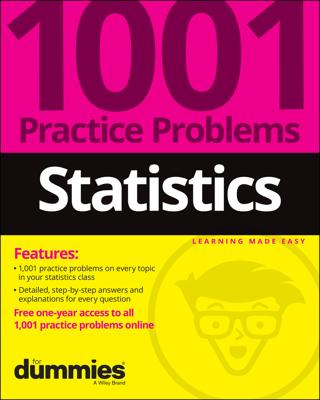When one number is divisible by a second number, you can divide the first number by the second without having anything left over. For example, 16 is divisible by 8 because 16 / 8 = 2, with no remainder. You can use a bunch of tricks for testing divisibility without actually doing the division.
The most common tests are for divisibility by 2, 3, 5, and 11. Testing for divisibility by 2 and 5 are child's play; testing for divisibility by 3 and 11 requires a little more work. Here are some quick tests:
By 2: Any number that ends in an even number (2, 4, 6, 8, or 0) is even — that is, it's divisible by 2. All numbers ending in an odd number (1, 3, 5, 7, or 9) are odd — that is, they aren't divisible by 2.
By 3: Any number whose digital root is 3, 6, or 9 is divisible by 3; all other numbers (except 0) aren't. To find the digital root of a number, just add up the digits. If the result has more than one digit, add up those digits and repeat until your result has one digit.
By 5: Any number that ends in 5 or 0 is divisible by 5; all other numbers aren't.
By 11: Alternately place plus signs and minus signs in front of all the digits and find the answer. If the result is 0 or any number that's divisible by 11 (even if this result is a negative number), the number is divisible by 11; otherwise, it isn't. Remember: Always put a plus sign in front of the first number.
Sample questions
Which of the following numbers are divisible by 3?
a. 31
b. 54
c. 768
d. 2,809
Add the digits to determine each number’s digital root; if the digital root is 3, 6, or 9, the number is divisible by 3:
a. 31: No, because 3 + 1 = 4 (check: 31 / 3 = 10 r 1)
b. 54: Yes, because 5 + 4 = 9 (check: 54 / 3 = 18)
c. 768: Yes, because 7 + 6 + 8 = 21 and 2 + 1 = 3 (check: 768 / 3 = 256)
d. 2,809: No, because 2 + 8 + 0 + 9 = 19, 1 + 9 = 10, and 1 + 0 = 1 (check: 2,809 / 3 = 936 r 1)
Which of the following numbers are divisible by 11?
a. 71
b. 154
c. 528
d. 28,094
Place + and – signs between the numbers and determine whether the result is 0 or a multiple of 11:
a. 71: No, because +7 – 1 = 6 (check: 71 / 11 = 6 r 5)
b. 154: Yes, because +1 – 5 + 4 = 0 (check: 154 / 11 = 14)
c. 528: Yes, because +5 – 2 + 8 = 11 (check: 528 / 11 = 48)
d. 28,094: Yes, because +2 – 8 + 0 – 9 + 4 = –11 (check: 28,094 / 11 = 2,554)
Practice questions
Which of the following numbers are divisible by 2?
a. 37
b. 82
c. 111
d. 75,316
Which of the following numbers are divisible by 5?
a. 75
b. 103
c. 230
d. 9,995
Which of the following numbers are divisible by 3?
a. 81
b. 304
c. 986
d. 4,444,444
Which of the following numbers are divisible by 11?
a. 42
b. 187
c. 726
d. 1,969
Following are the answers to the practice questions:
b and d
a. 37: No, because it’s odd (check: 37 / 2 = 18 r 1)
b. 82: Yes, because it’s even (check: 82 / 2 = 41)
c. 111: No, because it’s odd (check: 111 / 2 = 55 r 1)
d. 75,316: Yes, because it’s even (check: 75,316 / 2 = 37,658)
a, c, and d
a. 75: Yes, because it ends in 5 (check: 75 / 5 = 25)
b. 103: No, because it ends in 3, not 0 or 5 (check: 103 / 5 = 20 r 3)
c. 230: Yes, because it ends in 0 (check: 230 / 5 = 46)
d. 9,995: Yes, because it ends in 5 (check: 9,995 / 5 = 1,999)
a
a. 81: Yes, because 8 + 1 = 9 (check: 81 / 3 = 27)
b. 304: No, because 3 + 0 + 4 = 7 (check: 304 / 3 = 101 r 1)
c. 986: No, because 9 + 8 + 6 = 23 and 2 + 3 = 5 (check: 986 / 3 = 328 r 2)
d. 4,444,444: No, because 4 + 4 + 4 + 4 + 4 + 4 + 4 = 28, 2 + 8 = 10, and 1 + 0 = 1 (check: 4,444,444 / 3 = 1,481,481 r 1)
b, c, and d. Note: Answers add up to 0 or a multiple of 11 for numbers divisible by 11:
a. 42: No, because +4 – 2 = 2 (check: 42 / 11 = 3 r 9)
b. 187: Yes, because +1 – 8 + 7 = 0 (check: 187 / 11 = 17)
c. 726: Yes, because +7 – 2 + 6 = 11 (check: 726 / 11 = 66)
d. 1,969: Yes, because +1 – 9 + 6 – 9 = –11 (check: 1,969 / 11 = 179)

